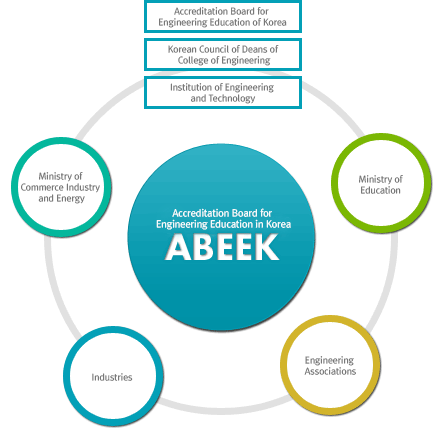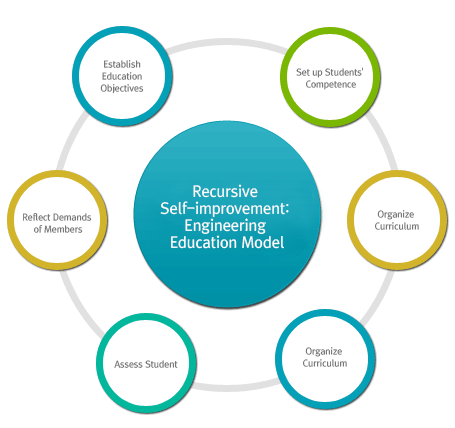Accreditation Board for Engineering Education of Korea
- A system designed to assure that engineering graduates who studied accredited programs are ready to meet the needs of engineering industries
- Accreditation of a program which takes a new and creative approach in order to enhance quality of engineering education and produce creative engineers who can respond to changing environments
- Aiming to increase productivity and enhance competitiveness by reflecting the demands of industries and other engineering fields and accrediting respective engineering colleges

Accreditation Board for Engineering Education in Korea
Basic Purpose of ABEEK Establishment
- To set up a program for the comprehensive analysis and assessment of engineering curriculum
- To set up a program for the comprehensive analysis and assessment of engineering curriculum
- To promote substantial development of engineering education by helping those who seek a engineering or relevant profession enhance their competence
- To help the establishment and improvement of educational programs of the colleges of engineering
- To produce competent and creative engineers who can play a leading role in the knowledge society

Recursive Self-improvement Model
Purpose of ABEEK
- To set up a program for the comprehensive analysis and assessment of engineering curriculum
- To promote substantial development of engineering education
- To produce creative engineers
- To help the establishment and improvement of educational programs of the colleges of engineering
- To help the establishment and improvement of educational programs of the colleges of engineering and take the lead in enhancing competence of those who seek a engineering or relevant profession
Effect of Engineering Accreditation
- To improve the leading competence of engineering students
- To increase global competitiveness of engineering education by achieving international recognition
- To take an advantage in employment and student admissions in the case of an accredited university
- To provide realistic education programs that can meet the needs of industries
- To raise national competitiveness by producing graduates required by businesses
Requirements of Engineers
- An ability to apply knowledge of mathematics, basic science, engineering, and information technology
- An ability to design and conduct experiments, as well as to analyze and interpret data
- An ability to devise a system, component, or process to meet desired needs within realistic constraints
- An ability to identify, formulate, and solve engineering problems
- An ability to use techniques, skills, and engineering tools necessary for engineering practice
- An ability to function in multi-disciplinary teams
- An ability to communicate effectively
- A recognition of the need for, and an ability to engage in life-long learning
- A broad understanding of the impact of engineering solutions in economic, environmental, and societal context
- A knowledge of contemporary issues
- An understanding of professional and ethical responsibilities
- An understanding of other cultures and an ability to engage in international cooperation

